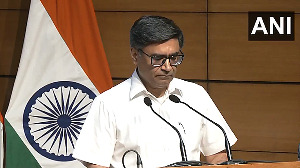'I tell young entrepreneurs if you don't have a great idea, if you don't have a good business model, don't think of a start-up.'

According to the 2023-2024 Economic Survey, only 51.25% of graduates in India are considered employable.
This means about half of the graduates are not ready to enter the workforce after college.
Is the situation really that bad?
According to DPIIT Start up India, the country has the third largest start-up ecosystem in India.
Is India's start up ecosystem one of the best in the world?
Who else is more qualified to talk about the current trend in the IT industry and the start-up ecosystem than Dr Ganesh Natarajan who has mentored many young entrepreneurs, invested in five accelerator and venture funds and enabled more than 80 start-ups and high growth companies in the IT industry for more than three decades?
"Entrepreneurs have to be more realistic. It is not easy to build a company, they have to sweat it out. They should realise that if they have nothing new to offer, the world is not going to come and give them tonnes of money," Dr Natarajan tells Rediff.com's Shobha Warrier.
- Part 1 of the Interview: 'You Can't Expect To Get Hot Potatoes From Colleges'
You founded 5F World which is a platform for digital start-ups, skills and social ventures.
How do you compare the start-up scene in India compared to say, the US or China?
Yes, I directly invest in start-ups. I am also an investor, board director and GP in accelerators and venture funds like IAN, 1Crowd, CentreSpan and Arise which find and invest in entrepreneurs.
Cumulatively, we would have invested in over 80 start-ups. So, I can say with experience and conviction that the quality of Indian start-ups is comparable to the rest of the world.
The difference between America and India is that America has a very large ecosystem for start-ups. There is tremendous amount of funding there, and even if you fail as an entrepreneur, you can very quickly start all over again.
If there is at least 20% success rate for the start-ups, it is very good for the country.
I would say, the start-up movement in India is much more steady and growing now.
But we need large capital providers.
Unfortunately, in India patient capital is not adequate. Any deep tech start-up needs 3 to 4 rounds of significant funding to become a world beater.
But most investors in India want a start-up to become successful or be a Unicorn in 2 to 3 years' time. We have to be more realistic.
A government grant of Rs 25 lakhs is not enough. An initial funding of Rs 2 crore (Rs 20 million) will take a start-up only so far. What we need is a runway of capital, maybe all the way to an IPO.

Many entrepreneurs I spoke to say the start-up ecosystem in India is still not friendly to them. Do you think so?
For every two good start-ups with great ideas, there are a lot of people who are attracted by the hype.
The reality is that the job situation is not very good in the country. But not getting a job should not be the reason to have a start-up.
I talk to a lot of young entrepreneurs. I tell them, if you don't have a great idea, if you don't have a good business model, don't think of a start-up.
Then you have to build the right team, get the right customers and only after that, you should go for the capital.
Without a great idea, a great business model, the right team and right customers, you can't complain by saying, I am not getting the capital.
I would say, entrepreneurs also have to be more realistic. It is not easy to build a company, they have to sweat it out.
They should realise that if they have nothing new to offer, the world is not going to come and give them tonnes of money.

As a person who has invested in many companies, what do you look for in a person who comes to you with a start-up idea?
First of all, I look for shining eyes, somebody who is really passionate about what she is doing.
That's the first thing I look for, the quality of the entrepreneur.
The second thing I look for is, whether s/he has a good product idea that is different, to offer.
Then, whether s/he has a business model that can be scaled and how s/he is taking it to the market.

What will be your advice to budding entrepreneurs?
Don't jump in to entrepreneurship for the wrong reason.
Jump in if you are passionate about the idea.
Don't jump in because it is fashionable to be an entrepreneur which is an absolutely wrong reason to be one.
If they don't follow these rules, they will make it difficult for us investors also.
 IMAGE: Dr Ganesh Natarajan
IMAGE: Dr Ganesh NatarajanWhy did you start Light House?
The biggest problem in the country today is that 60% of the youth in India are under privileged and are left behind.
But they also have aspirations, ambitions and dreams. To realise those dreams, they need jobs, and they want to be successful in their jobs.
Light House was started primarily for the youth in urban slums, to provide the pathway.
If you look at Pune where I live, there are 600 slums. Looking at the young people living there, we thought, what about the aspirations and dreams of the slum youth?
We first worked with 600 slum youth and skilled them. The result was, 80% of them got jobs.
Today, we have 42 Light Houses across five states.
In the last 6 years, we trained 180,000 young people. Our goal is to train 1 million youth by 2030.
Feature Presentation: Aslam Hunani/Rediff.com











